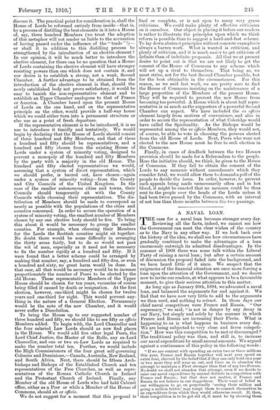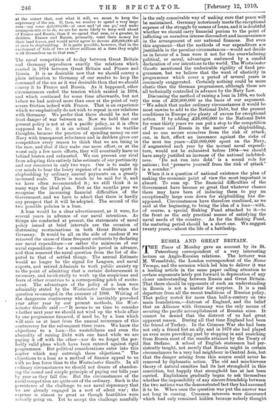A NAVAL LOAN.
THE case for a naval loan becomes stronger every day. Reviewing all the facts, indeed, we cannot see how the Government can meet the clear wishes of the country as to the Navy in any other way. If we look back over the history of the idea, we shall see how circumstances have gradually combined to make the advantages of a loan enormously outweigh its admitted disadvantages. In the summer of 1908 there was some talk within the Liberal Party of raising a naval loan ; but after a certain amount of discussion the proposal faded into the background, and we have heard little of it since. We suspect that the exigencies of the financial situation are once more forcing a loan upon the attention of the Government, and we desire now to invite our readers, at what appears to be a favourable moment, to give their serious attention to this matter.
As long ago as January 20th, 1894, we advocated a naval loan, and balanced the arguments for and against it. We find that we have now very little to add to the arguments we then used, and nothing to retract. In those days our chief naval competitors were France and Russia. " Our supremacy," we said, " is not in danger by any decay in our Navy, but simply and solely by the manner in which France and Russia are increasing their Fleets. What is happening to us is what happens in business every day. We are being subjected. to very close and fierce competi- tion." How was this competition to he met or discouraged ? The traditional policy was then, and still is, to increase our naval expenditure by small annual amounts. We argued against a continuance of this policy in the following words :
" If we are content with spending an extra two or three millions this year, France and Russia together will next year spend an extra four, cheered by the belief that if they can only hold on a year or two more they will wear us out, and force us to abandon the attempt to maintain a Fleet stronger than that of any two Powers. No doubt we shall not abandon that attempt, even if we decide to raise our naval expenditure by annual driblets in competition with France and Russia ; but that does not matter, if France and Russia do not believe in our doggedness. Their want of belief in our willingness to go on perpetually `seeing their million and going a million better,' may tempt them to commit themselves to an expenditure from which they would otherwise recoil. If, then, their competition is to be got rid of, it must be by showing them
.at the outset that, cost what it will, we mean to keep the supremacy of the sea. If, then, we resolve to spend a very large sum—say some 2.26,000,000—at once and 'at one go,' and make arrangements so to do, we are far more likely to keep well ahead of France and Russia, than if we spend that sum, or a greater, in driblets. France and Russia, primarily, want their money for their land forces, and would never agree to devote £26,000,000 all at once to shipbuilding. It is quite possible, however, that in the excitement of bids of two or three millions at a time they might work themselves up to that sum."
The naval competition of to-day between Great Britain and Germany reproduces exactly the relations which existed in 1894 between Great Britain and France and Russia. It is as desirable now that we should convey a plain intimation to Germany of our resolve to keep the command of the sea as it was desirable then that we should convey it to France and Russia. As it happened, other circumstances ended the tension which existed in 1894, and which continued for some time afterwards, but not before we had arrived more than once at the point of -very severe friction indeed with France. That is an experience which we emphatically do not wish to repeat in our relations with Germany. We prefer that there should be not the least danger of war between us. Now we hold that our present policy is not at all a. pacific policy, as it is often supposed to be ; it is an actual incentive to warlike thoughts, because the practice of spending money on our Navy with transparent reluctance and in driblets gives our competitors every reason to think that we are tiring in the race, and that if they make one more effort, or at the worst only a few more efforts, they will eventually leave us behind beaten and exhausted. We can prevent our rival from adopting this entirely false estimate of our pertinacity and our resources in only two ways. One is to make up our minds to bear the heavy expense of a sudden spurt in shipbuilding by ordinary annual payments on a greatly increased scale. There is much to be said for it, and we have often recommended it ; we still think it in many ways the ideal plan. But as the months pass we recognise the increasing financial difficulties of the Government, and we have to admit that there is hardly any prospect that it will be adopted. The second of the two possible policies is a loan.
A loan would be a clear advertisement, as it were, for several years in advance of our naval intentions. As things are conducted at present, the statements of naval policy issued at brief intervals are the occasion of distressing recriminations in both Great Britain and Germany. It would be all on the side of candour if we removed the cause of these frequent outbursts by declaring our naval expenditure—or rather the minimum of our naval expenditure—for a considerable period in advance, and thus removed the naval question from the list of dis- puted to that of settled things. The annual Estimate would no longer be the signal for Leagues, and naval experts, and retired Admirals to work public anxiety up to the point of admitting that a certain disbursement is necessary, and incidentally to work up the suspicions and fears of other countries to a corresponding pitch of excite- ment. The advantages of the policy of a loan were admirably stated by the Westminster Gazette when the question re-emerged in the summer of 1908. Writing of the dangerous controversy which is inevitably provoked year after year by our present methods, the West- minster Gazette said :—" It seems to us time to consider a bother next year we should not wind up the whole affair by one programme financed, if need be, by a loan which ill save us at least from the annual recurrence of this controversy for the subsequent three years. We know the objections to a loan—the wastefulness and even the absurdity of raising Debt with one hand while we are paying it off with the other—nor do we forget the per- fectly valid pleas which have been entered against rigid programmes. But political considerations enter into this matter which may outweigh these objections." The objections to a loan as a method of finance appeal to us ith no less force than to the Westminster Gazette. In all crdinary circumstances we should not dream of abandon- ing the sound and simple principle of paying our bills year by year as they fall due. But the circumstances of the naval competition are quite out of the ordinary. Such is the persistence of the challenge to our naval supremacy that we are already engaged in a sort of silent war ; the expense is almost as great as though hostilities were actually going on. Yet to accept the challenge manfully is the only conceivable way of making sure that peace will be maintained Germany notoriously meets the exceptional expense of the struggle by means of loans, and it is doubtful whether we should carry financial purism to the point of inflicting on ourselves intense discomfort and inconvenience in the arrangement of our national finances. But even this argument—that the methods of war expenditure are justifiable in the peculiar circumstances—would not decide us in favour of a loan were it not for the overwhelming political, or moral, advantages embraced by a candid declaration of our intentions to the world. The Westminster Gazette mentioned the undesirable rigidity of fixed pro- grammes, but we believe that the want of elasticity in programmes which cover a period of several years is commonly exaggerated. Certainly nothing could be more elastic than the German programmes, although these are all technically controlled in advance by the Navy Law. Discussing the method of raising a loan in 1894, we took the sum of £26,000,000 as the basis of our argument. " We admit that under ordinary circumstances it would be most unwise to add to the National Debt, but the present conditions in Europe give plenty of excuse for exceptional action. If by adding £26,000,000 to the National Debt for some thirty years we can put a stop to the competition of France and Russia in the matter of shipbuilding, and so can secure ourselves from the risk of attack, can, in fact, effect an insurance against the risks of the next ten years—X26,000,000 spent on the Navy, if augmented each year by the normal naval expendi- ture, would not be exhausted before 1904—we should have amply justified an increase of the national indebted- ness. ' Do not run into debt' is a sound rule for nations ; but preserve yourself from the risk of attack' is a sounder."
When it is a question of national existence the plan of making the economic point of -view the most important is absurd. To sum up. The financial difficulties of the Government have become so great that whatever chance there may have been of inducing them to pay an exceptionally large sum down for shipbuilding has dis- appeared. Circumstances have therefore combined, as we said at the beginning, to bring the idea of a loan—with, of course, a special Sinking Fund attached to it—to the front as the only practical means of satisfying the naval needs of the country. As for the Sinking Fund, the maturing period should be a short one. We suggest twenty years,—about the life of a battleship.











































 Previous page
Previous page